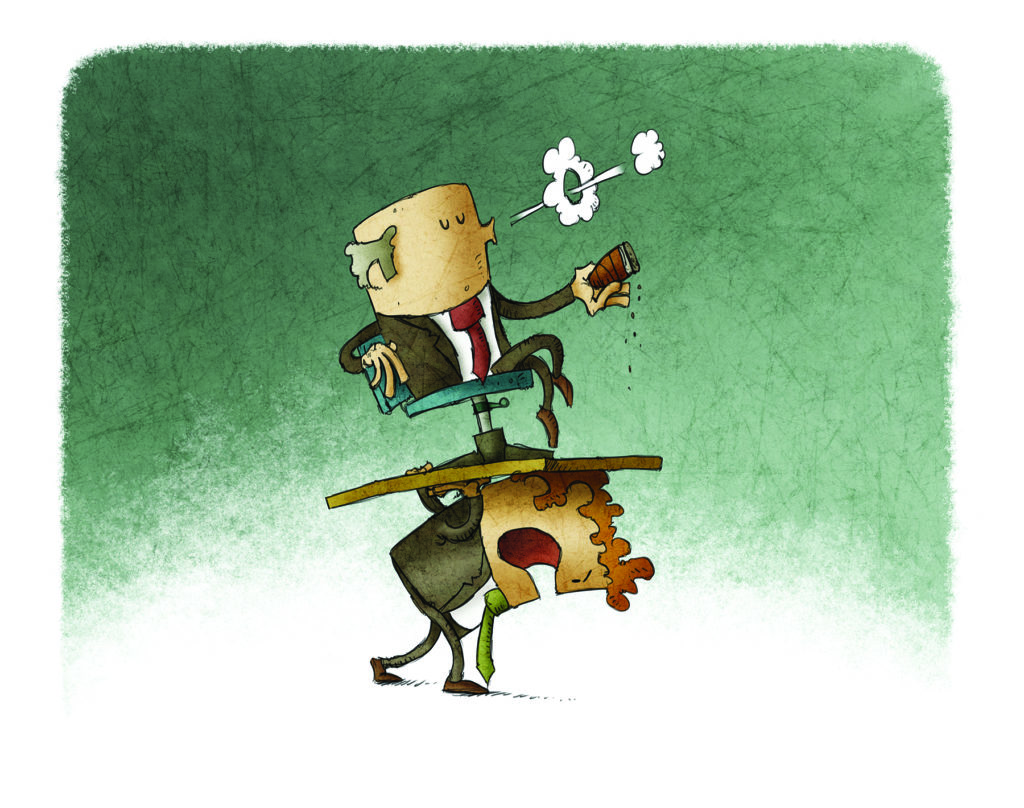What’s Hot…And What’s Not –– Part Nine
A Dozen Ways FEC Owners & Managers are Failing Business Management 101

by Frank Seninsky, President/CEO Amusement Entertainment Management (AEM) & Alpha-Omega Amusements & Sales
Running a profitable business means managing people effectively and yet today when I visit FECs, I see example after example of poor management practices. When I point out the trouble to the ownership, it’s clear they aren’t even aware of how their personal behavior and even body language is perceived by both employees and customers. Do you recognize these management sins in your own business?
1. Micromanaging Employees
Why do owners micromanage? Is it as simple as they often get frustrated having to train and retrain the staff due to high turnover? They’ll think, “I can do this same task with my hands tied behind my back.” It’s impossible for your staff not to pick up on this attitude and the result is that they’ll lose interest in less than six seconds in what you’re trying to teach them, becoming even less effective employees. That, of course, leads to even higher staff turnover and more training/retraining, the very problem that was causing the management’s frustration to begin with.
The micromanager also doesn’t empower his/her staff to make their own decisions. What you end up with is employees running to the manager with each little problem, whether it’s a customer complaint, a problem in the kitchen, a broken game … everything and anything. Talk about a drag on operations!
2. Eye Contact and “The Nod”
As a manager or owner, do you smile and look people in the eye when you talk to them? How do you know that people are actually listening to you when you talk? I’m noticing now, no matter who I talk to in the outside world, people nod their heads like they get what I’m saying, but in truth, haven’t picked up a single point. This might be due to the decreasing attention span in general or other issues. Attention span is now something like 8 seconds maximum.
When I go onsite to help troubleshoot an FEC or business, I’ll interview the staff and various teams to pick up on the company’s culture. It’s enlightening to see people in meetings, nodding their heads as you speak, and if you look them in the eye for the extra connection, they’ll say “yes” or “yeah” indicating that they’ve got the point. When I get them one on one, I can immediately tell when someone has a hearing problem and/or hasn’t heard a thing I or anyone else has said because their mind was thinking about something else.
Another time, I was reviewing material on the computer and going from screen to screen with examples with a general manager. When I was finished, I closed the computer and asked him to write down something (anything) he’d seen on the screen. He couldn’t and admitted that he’d left his glasses in the car, but was too ashamed to mention that.
As business owners and managers, do you have a company culture that encourages the employee that smiles and nods, but isn’t really connecting and learning? Are you engaging with them individually to ensure that they really do “get it” and aren’t simply posturing and returning to work with nothing learned?
3. Not Enough Employees Because You Want to Reduce Labor Costs
In these times when the discussion is swirling around about increasing the minimum wage to $15/hr. and paying employees more to increase retention, are you trying to reduce the size of your staff while still expecting them to do the same amount of work and provide great customer service at the same time? In many cases, employees are supposedly being cross trained, but they’re really not. You end up putting people into the wrong positions, trying to put the proverbial square peg in the round hole. The result is total chaos within the organization.

4. Too Many Meetings & They Are Too Long
Bosses have these things called meetings, which I believe in most cases are useless. The only way I think a meeting is good is if it lasts less than 17 seconds. We started doing psychological studies, and have found a majority of people have a maximum attention span of 15 minutes.
I think we will move away from being a culture of learners since it’s so easy to ask Google or Siri for an answer. Why do we need to learn and retain information when we can so easily get the answer to just about anything with a quick question or search? I’ve also learned to only put in one action item per email.
Once today’s reader gets to that first sentence and first task, they tune out from the rest of the message and never actually read it.
5. Hiring People Who Are Too Accommodating
In taking courses, like one at Berkeley University, you start learning about the best ways to interview and hire A-plus people for your organization. These are often seen as the multitaskers, people who are fun, folks who smile all the time, people like the Energizer Bunny. That’s what everybody seems to want. But there is a negative: often, these same people can’t seem to handle any peer pressure. Their “friends” can get them to do just about anything.
On the face of it (pun intended), people who smile all the time look great. But, be sure your team members aren’t being so agreeable that they let the customers and other staff members walk all over them and your company. The “customer is always right” philosophy works often, but there has to be limits. Managers need to look for and hire people with a degree of street smarts (something you can’t really teach) and work with them to be responsive to customer issues without giving away the store.

6. Misuse & Theft of Company Goods
Managers or owners who walk into the snack bar, grab a cup, fill it with Pepsi or Coke and don’t pay for it are a real problem. What they are teaching the staff is that soda is free … and so is all the food … and so is everything else. What employees see is the manager or owner stealing from the company. This breeds a lack of respect for that owner/manager and for the company.
That’s a real tangible example, but there are problems when it comes to data, as well, with many ways in which owners/managers can negatively affect the business by misusing or gathering the wrong information.
Some will grab data from every direction – inconsistently – and do not know what to do with it. When I’m working with a center, the owner/manager will send all sorts of data to me that he or she spends hours inputting and poring over. What I end up having to tell them is that the whole data package is meaningless: garbage in produces garbage out.
You see this often with redemption prizes and how they set ticket/point values. It’s inconsistent and you end up not knowing how much inventory was being stolen, used or redeemed, often because they’re simply copying what other centers do, whether it’s good or bad.
I’m working with one FEC now where the owner buys way too many redemption items, sometimes just one or two of each, with no rhyme or reason. He just buys what he likes. If that prize is actually redeemed, he orders one more. If it isn’t redeemed, that prize just stays in the redemption prize center and its duplicate gathers dust, cobwebs, and mold in the storeroom for years and years. No employee can ever figure out what to do with all this stuff. The inventory builds up…and so does the overhead.
Also, if you give your staff too much leeway, they’ll take advantage. For example, in one FEC, the owner gave the general manager $200 per week in token refunds he could hand out to help solve problems (complaints and that sort of thing). Instead of using these discretionary tokens properly, the GM ended up just handing out freebies to his friends. Of course, the owner wasn’t monitoring it, and just kept adding the $200 to the GM’s token bank every week. Multiply that times 52 weeks and see how much money was lost with just this open loop ($10,400/year).
Managers leaving “things” around that can be taken or borrowed are also a problem. Whether it be keys, tickets, tokens, debit cards or you name it, it will be taken by the staff. I believe that today almost 100 percent of all kids cheat their way through school. When I went to school, I’d say it was maybe four or five percent. My definition of cheating includes using a credit card to pay someone online to write a paper or to have your mom or dad or brother/sister/friend do your homework or science project for you.
If you don’t think so, just look at what kids do today and what they accept as normal: paying for a term paper, using their phones during a test to text answers back and forth, reading the CliffsNotes instead of the actual book. Today, according to their standards, they don’t think that’s really “cheating.” Even some of the teachers in certain schools get into it by providing answers to test questions in advance so their classroom achievement/school ranking is higher.
Another threat to your property is from employees who do similar work on the side. They might offer home game repair or perform tech services for another operator. They need a part to fix a machine, you’ve got that in your inventory and boom, off it goes. They’re making a fortune selling or using your parts. Inventory is one of the biggest areas for theft right out in front of you.
Another thing I’ve learned about people in general is that they don’t often steal on their own, but tend to do it in pairs. They work together in an effort to steal stuff and the more technical, the more creative they are. I watched two staffers collect all the debit cards people threw in the trash bins or left around that still had value on them. They found a way to take most of the value off, keeping a little on so as to avoid detection when they would be cleared, and loaded the rest onto a card of their own.
Owners and managers have to be on top of employee theft. You have to set up red flags with your debit card system or your hand generated weekly revenue reports to look for unusual activity during a shift. Maybe there’s one shift where five times the points are redeemed than is typical for that day and time. You have to track it and find out when things are out of order, or outside of the norm. One tip: If a weekly bank (like a bill changer) ever comes out perfect, chances are a staffer is stealing.
7. Theft of Time Is Still Theft!
Fact: Employees steal time. America loses billions each year to this. Examples: staff spending time on their cellphones and computers checking social media, ordering personal stuff, watching videos, etc. Whatever they’re doing, they’re not working. A manager who does this tells the rest of the crew that this behavior is not only tolerated, but that it’s okay. It’s just another form of cheating.

8. The Boss is Too Good to Do the Dirty Work
The team will not respect an owner or manager who doesn’t get his hands dirty. Someone at the top who doesn’t get down and do the exact same work the staff is expected to do when it’s needed isn’t worth anything to the team. If you think that sort of thing doesn’t get noticed, you’re wrong. It does and it pulls morale down, as well as sets a standard of what being in management means.

9. Owner in the Office, Not Out On the Floor
When an owner or GM has a private area or office and closes the door behind him, what do employees think is happening? Do they think they’re really doing work? Probably not! If you’re an owner or a general manager, I don’t even know why you’d need an office. You should be out on the floor interacting with your staff and customers, helping them and teaching them. I can’t think what a GM is going to do that’s more important than that. If they have paperwork to do, they might want to consider doing that on their off hours at home.
10. Travel, Entertainment & the Sharing of P&L Matters
Some owners use their businesses to write off entertainment and travel. They’re always out of the facility, going to places like trade shows, conventions, vacations, etc. Conversely, I see some other P&L statements that put their entertainment spending at only $200 for the year because they’re always on site working. It goes both ways, but your employees know what you’re doing. They’re pretty smart.
Some owners hide all financials from their employees with the result that the staff never knows what the revenue and expense priorities are to keep the business profitable. And there are other owners who share everything with their managers. After almost five decades of experience, I can walk in to a center and just by watching for about seven minutes or so can tell you what that center is grossing for the year within 5 percent. It’s really no secret. I can probably tell you if that center is losing money, too.
What’s tragic is that everybody thinks FECs are so successful (especially if one visits them only on a Saturday) that they copy everything they do, carrying the same bad habits elsewhere.
I see these bad habits a lot, especially when it comes to birthday parties, as managers teach the staff how to upsell. They do it without really understanding the math of it –– never spreadsheeting it –– selling bigger, higher-priced parties, without realizing that as they upgrade to a higher dollar amount/party, the center is actually making less money per person. They simply don’t know any better and no one takes the time to dig into the numbers.
Similar problems arise when the person ordering redemption and crane merchandise isn’t trained properly. A common example is the manager who sees similar items from a couple of sources and makes the buying decision solely on price without factoring in the quality. Is it wise to save a couple of pennies per item, but have merchandise that breaks and has a negative effect on the customers? How does that play out with your customers? How do they react when they get home with the prize and it breaks right away? Do they come back and ask for a replacement? Do they just decide not to come to your fun center again? Do they tell their friends what crappy prizes you have or do some get so irked that they complain on social media?
11. Not Dressing & Acting Professionally
An owner or manager who doesn’t dress properly sets a bad example. After all, how do you enforce a dress code for your employees if you dress like a slob yourself? Also, how professional is it to elevate yourself above your employees?
I made the mistake once of saving the most up-front parking spots for myself and another owner. I will never do that again. Whichever employee gets to work first gets the spot closest to the entrance. It’s also poor form to show up to work in a super fancy expensive car. You do that sort of thing, then you should understand the ramifications which often result in your FEC not performing optimally. You’re going to pay the price for this one way or the other.
12. Not Being Stern Enough & Always Fair
There are so many owners/GMs out there who simply can’t fire people. I’m not saying you should let someone go the first time they make a mistake, but you can’t forgive people all the time either. Word gets around that you’re a patsy.
I suffer from that too. I can debate this all day long, but I’ve settled on being a three-strikes-you’re-out kind of guy. When someone screws up, I take the time to teach them why and if they end up making the same mistake again, sometimes years later, I’ll go over it again asking, “How did this happen? Is there another circumstance that came up, that caused you to make this same mistake again?” And sometimes there is so then they get a second chance. The third time, same mistake, and “you’re out!” just like the umpire says in baseball. There is no instant replay.
Owners and managers need to develop a clear and consistent way of dealing with staff mistakes that both supports the growth of each individual at the company while protecting its bottom line.
Conclusion
Pay attention to the 12 business management mistakes and your staff turnaround will decrease and there’s a good chance your customers will stay longer, spend more money and even come back more often (maybe bringing along a new customer as well). One last tip: An owner or GM who spends just 10 minutes per week with each key staff person can have a huge positive effect, not only on that person but on the entire staff.
What management issues do you encounter and how do you solve them? Share them with me by emailing [email protected].
Frank Seninsky is president of the Alpha-Omega Group of companies, which includes a consulting agency (Amusement Entertainment Management), two nationwide revenue-sharing equipment suppliers (Alpha-Omega Amusements and Alpha-BET Entertainment), and Alpha-Omega Sales, a full-line game and related equipment distributor. During his 47 years in the leisure entertainment industry, Seninsky has presented nearly 400 seminars and continues to regularly write columns in numerous trade publications. He served as president of the AMOA (and was on the board for 22 years), and was president of IALEI (founding member and on the board for 11 years). Frank is the sole owner of Foundations Entertainment University, now in its 16th year. He is also considered a leading industry expert in the design, layout, and operations of coin-/debit card-operated arcades and FEC attractions, and is often called upon as an expert witness in cases involving the amusement industry. Frank edits The Redemption & FEC Report e-newsletter (35,000+ readers worldwide) and also writes a blog at www. frank-thecrank.com. Frank can be reached by phone at 732- 616-5345 or by email at [email protected] (website: www.AEMLLC.com).


1 Comment
Pingback: A Dozen Ways FEC Owners & Managers are Failing Business Management 101 - Frank 'the Crank' Seninsky Blog